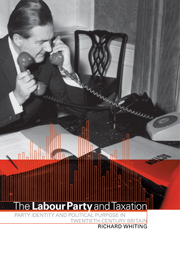Book contents
- Frontmatter
- Contents
- List of tables
- Acknowledgements
- List of abbreviations
- Introduction: Taxation and political debate
- 1 Struggles within a liberal inheritance, 1906–1940
- 2 The changing balance of tax interests, 1940–1954
- 3 The Kaldor era, 1951–1965
- 4 Social democracy examined, 1965–1970
- 5 Defensive positions, 1970–1979
- 6 Epilogue: New Labour, old problems?
- 7 Conclusion
- Select bibliography
- Index
4 - Social democracy examined, 1965–1970
Published online by Cambridge University Press: 07 August 2009
- Frontmatter
- Contents
- List of tables
- Acknowledgements
- List of abbreviations
- Introduction: Taxation and political debate
- 1 Struggles within a liberal inheritance, 1906–1940
- 2 The changing balance of tax interests, 1940–1954
- 3 The Kaldor era, 1951–1965
- 4 Social democracy examined, 1965–1970
- 5 Defensive positions, 1970–1979
- 6 Epilogue: New Labour, old problems?
- 7 Conclusion
- Select bibliography
- Index
Summary
As far as the Labour Party was concerned, the reforms of 1965 were only the starting point for more serious inroads on inequality and redistribution. The capital gains and corporation taxes had addressed the workings of the tax system in the light of the substantial investigations and assessments of the 1950s. They did not deal explicitly with equality, in that they would have had little impact on the distribution of wealth, although a capital gains tax at a time of inflation had some effect in this direction because it fell on money rather than real gains. A tax agenda for the labour movement still had to be fulfilled. Following a protracted and acrimonious budget in 1965 the Labour government was therefore faced with fresh demands for more action. The TUC's submission for the 1966 budget caught the mood when it asked Callaghan:
to initiate fiscal action to reduce the glaring inequalities in the distribution of wealth and thus promote the social justice on which emphasis was laid in the statement of intent and the succeeding declaration on incomes policy. To this end the General Council wish to recommend for the Government's consideration the desirability of action to tax large gifts ‘inter vivos’ and to institute an annual tax on capital wealth.
But equality was now a matter not only of removing wealth from the rich but redistribution to the poor.
- Type
- Chapter
- Information
- The Labour Party and TaxationParty Identity and Political Purpose in Twentieth-Century Britain, pp. 173 - 213Publisher: Cambridge University PressPrint publication year: 2001



